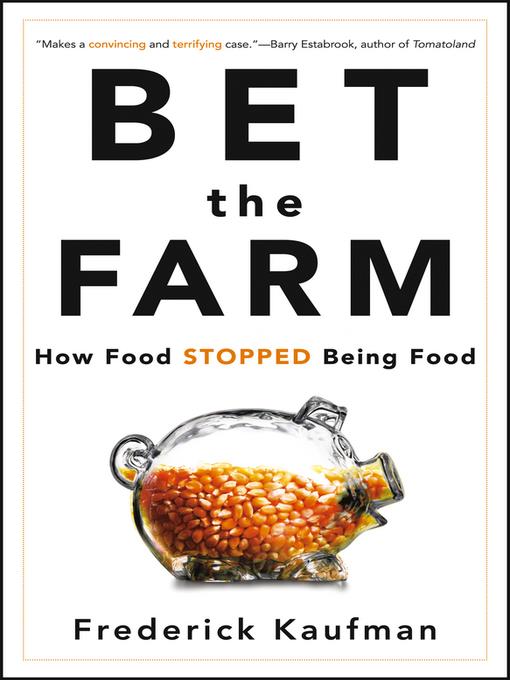
Bet the Farm
How Food Stopped Being Food
کتاب های مرتبط
- اطلاعات
- نقد و بررسی
- دیدگاه کاربران
نقد و بررسی

October 8, 2012
In this energetic, wide-ranging work of investigative journalism, Harper’s editor Kaufman argues that the new food revolution involves collateral products and processes, not food itself. He discusses Big Food through specific products and goes far behind the curtain of corporate processes and practices. The book is often a stew of figures, from dollars to statistics with an alphabet soup of organizational acronyms and italicized buzzwords for flavor. Along the way, it probes the complications of marrying apparent incompatibles such as free market economics and slow food, how food-related information converts to capital, and how technology facilitates and oversimplifies the industry. Hunger, the lack of food, is often Kaufman’s subtext and eventually evolves into his main. Yet this is neither dry argumentative soup nor antiglobalization polemic, and the villains aren’t black and white; Kaufman’s tone is subtly ironic without being snarky—a nice addition to Michael Pollan.

September 15, 2012
Beginning with a simple question--"Why can't inexpensive, healthy, and delicious food be available to everyone?"--Harper's contributing editor Kaufman (A Short History of the American Stomach, 2008, etc.) embarked on an odyssey into pizza kitchens, tomato fields, biotech labs, United Nations conference rooms and commodities exchanges. The author argues that we grow enough food to feed the world's population, but it's priced too high for the poorest one billion. "The price of basic farm goods drives world hunger," he writes, "but it also drives the push for sustainability, the rise of long-distance food from nowhere, the scourge of cheap and unhealthy foods, the single-minded drive to own the smallest molecules of food, the declarations and pledges of the politicians, the global mania for markets, and the profit margins of many of the world's largest corporations." He notes that the content of our meals often has very little to do with agriculture and getting seasonal products and more with economics and the exigencies of international commodities markets. Kaufman explains the history of wheat futures and their role in stabilizing food prices worldwide for over a century. Yet these commodity pricing tools have been eclipsed in recent years by new trading structures, derivative-trading hedge funds that trade food futures, increase volatility and drive up the price of food. In short, food, one of the most basic necessities of life, has become another avenue of asset allocation. So how do we stop this shift in food pricing and profiteering? Because they are global, food derivative markets are nearly impossible to curtail, but the author suggests position limits for traders and a national grain reserve, among other possible solutions. Kaufman went looking for a pizza and ended up on Wall Street, giving a revealing view into commodity markets and food pricing.
COPYRIGHT(2012) Kirkus Reviews, ALL RIGHTS RESERVED.

October 1, 2012
Much has been made of the organic, local, and slow-food movements, but when it comes to feeding seven-billion people, these laudable efforts represent a small fraction of the food supply. Food has become in effect a type of currency, and the universal currency of food is pizza. Kaufman deconstructs a Domino's pizza, tracing it back to the soil to find out how the massive quantities of wheat, tomatoes, meat (pepperoni), and milk (cheese) in it are produced. Surprisingly, he discovers a different movement of sorts, a sustainability movement being undertaken by the likes of industry giants Unilever, Tyson Foods, and the nation's largest grocer, Walmart, a company that has taken a proactive stance on the ecological impact of its products. At the Ohio State University's experimental research station, Kaufman considers the pros and cons of genetically modified food in a world in which new organisms are treated as intellectual property. These examinations lead us on a quest to discover why, in a world of food surpluses, a billion people still go hungry every day as food becomes increasingly globalized, industrialized, and commoditized.(Reprinted with permission of Booklist, copyright 2012, American Library Association.)

























دیدگاه کاربران